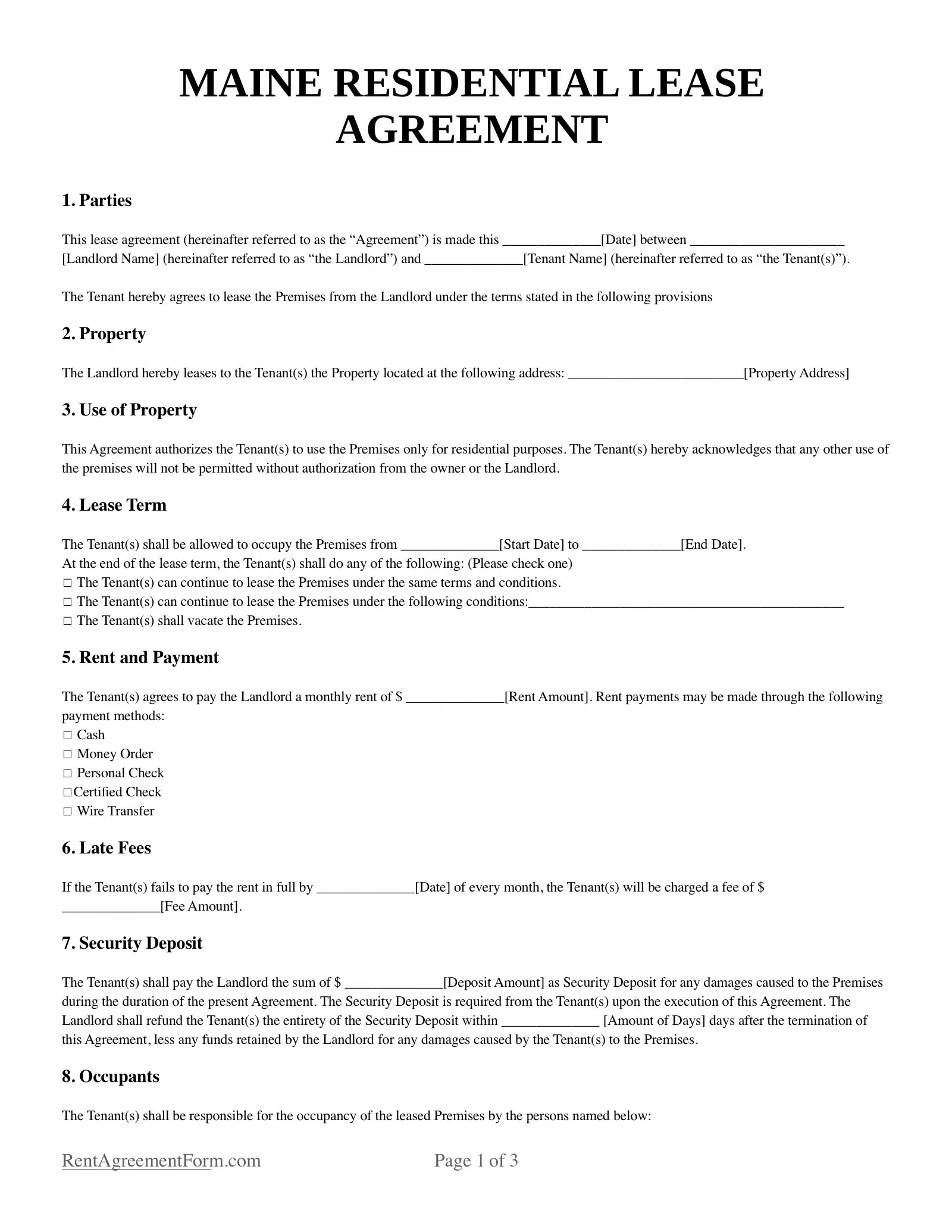Maine Residential Lease Agreement Form
While Maine doesn’t have megacities like New York or Los Angeles, there are plenty of locations where people relocate to the state.
Whether it’s for college, work, or family, there are plenty of reasons people are looking for a place to live in the Pine Tree State.
For realtors and property owners interested in renting out real estate in Maine, like an apartment or room, a simple Residential Lease Agreement should be used. Using this legal document creates a clear list of obligations of both the landlord and tenant.
A Residential Lease Agreement protects both landlords and tenants by setting fair and reasonable terms and conditions.
For example, the landlord will guarantee that the property is safe and everything is in working order.
The tenant must also agree to pay rent on time and keep the property at a good standard of maintenance by paying for any damages. The agreement also will lay out the consequences for bad behavior on the part of the tenant, including eviction.
Other important sections of a Maine Residential Lease Agreement include:
- Lease term
- Disclosures
- Payment
- Security deposit and other fees

Required Disclosures
In Maine, certain information must be made available to the tenants. The information below is given along with the Residential Lease Agreement.
- Bedbug Infestation Disclosure (§ 6021-A): If the rental property or the property next door has bed bugs or is currently having the bedbug problem taken care of it must be disclosed in the form.
- Electricity to Common Areas (§ 6024): It’s not possible for the landlord to charge the tenant for electricity, heat, or other utilities or services for common areas of the property, such as hallways, unless first reaching an agreement.
- Rental Housing Rights Disclosure Form: The disclosure form must be provided to the tenant before occupancy begins; however, it is for tenants that reside in Portland, Maine.
- Energy Efficiency Disclosure (§ 6030-C): The landlord must state that the tenant has a right to request energy costs and consumption history from the energy supplier.
- Radon Disclosure Form (§ 6030-D): Since 2012, landlords are obliged to check for radon on the property once every 10 years. The pamphlet must also be included with the Residential Lease Agreement.
- Security Deposit Location (§ 6038): Landlords must provide the name of the bank as well as the account number where the security deposit is stored.
- Smoking Policy (§ 6030-E): Smoking may be completely or partially allowed or prohibited; however, in any case, the smoking policy of the property must be clearly stated in the form.
- Lead-Based Paint Disclosure: All rental units built before 1978 must have this form which communicates the potential hazards of paint within the walls attached to the Residential Lease Agreement. This is a federal law.
Rent Grace Period
In the state of Maine, a rent grace period exists. The rent grace period is 15 days throughout the state, which means a landlord must wait until day 16 to charge the tenant a late fee or begin eviction proceedings (§ 6028(1)).
After 16 days, it will be possible for a landlord to give the tenant an eviction notice.
Security Deposits
When signing a Residential Lease Agreement in Maine, a security deposit is often required.
However, landlords can only charge a certain amount and return the deposit at the end of the tenancy.
- The maximum amount for a security deposit is 2 months' rent (§ 6032)
The limits for returning the deposit depend on the lease and are as follows:
- Fixed lease: 30 days
- Month-to-month lease: 21 days